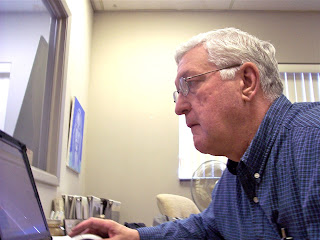Steve Crain is pictured as he worked in the early 2000s at Gulistan Carpet, a now-closed carpet Aberdeen, NC, carpet manufacturing company. He wrote columns often published then in "The Pilot," a Southern Pines, NC, newspaper.
To me, my dad appeared to be a negative thinker. Did his U.S. 84th Infantry duty in Germany during World War II make him that way? Mom said he was different after he returned in 1945.
Dad’s mother, a tall, thin lady, seemed sad and worried. She played a brown F-hole “B and J Serenader” guitar that I still have. She sang about hardship and lonesomeness as she strummed “Times Have Changed in Renfro Valley.”
“Negative people center their focus on things they can’t control,” sources say. “They ruminate over past conversations, beat themselves up on past mistakes, and allow their fear of the future to stop them in their tracks today.”
Studies show that personality traits can shift over time, and personality changes affect how we see the world. I’ve benefited from Bible input over the years, and my melancholy tendencies have given way to a more positive outlook.
Depression is known to run in families, suggesting that genetic factors contribute to the risk of developing this disease. But research into the genetics of depression is in its early stages, and little is known for certain about the genetic basis of the disease.
About 25 percent of your positive expectations, or dispositional optimism, comes from your genes, sources say, adding, “At least half comes from your life experiences.”
“THE NEGATIVITY BIAS”
The negativity bias, according to psychologists, is a tendency to have greater sensitivity to negative events than to positive events. Some researchers say that negative events “weigh” close to three times more than positive events.
According to researchers, a previously known gene variant can cause individuals to perceive emotional events — especially negative ones —more vividly than others. A study by a University of British Columbia researcher finds that some people are genetically predisposed to see the world darkly.
“Jesus does want His believers to find joy and to stay focused on positive thoughts — heavenly ones based on eternity,” Sophia Bricker writes. “He wants his followers not to worry, but to instead stay focused on and seek the Kingdom of God.”
Some people tell us just to “think positive.” But that response can involve avoiding reality.
“When we tell ourselves to ‘think positive’ and to push negative or difficult emotions aside, it won’t work; it doesn’t work,” says psychologist Susan Davis.
IS the POWER OF POSITIVE THINKING BIBLICAL?
“There are many people, Christians included, who believe that positive thinking has the power to change their lives,” Bricker says. “Visualizing their successful lives, such people practice positive thinking believing that they will become richer, more successful, and healthier.”
Bricker says there is nothing wrong with optimism or looking on the bright side, but the philosophy that asserts there is inherent (in itself) power in positive thinking is not Biblical.
“Using positive thinking exercises, practices, or mantras as a magical or powerful force cannot change a person or anything in their life,” Bricker says. “Placing one’s hope or trust in anything other than the Lord is idolatry and clearly condemned in Scripture. For Bible-believing, faithful Christians, using positive thinking as a magnetic force to bring about change or success in life is not an option.”
People who trust in positive thinking need to realize that true happiness and change only comes through Jesus Christ, not the power of positive thoughts, Bricker says.
The Rev. Norman Vincent Peale (known as “the father of positive thinking”) wrote the book “The Power of Positive Thinking.” Published in Oct. 1952, it and was on the New York Times’ best-sellers list for 186 weeks. He seemed to try to mesh positive thinking with Christianity.
Ms. Oprah Winfrey credits “positive thinking” and “the law of attraction” to some of her success. “The law of attraction (LOA) is the belief that the universe creates and provides for you that which your thoughts are focused on.” That is not a Christian concept.
Positive thinking has value. It’s good therapy that helps some people look on the brighter side. But some folk believe in positive thinking as their go-to “religion” and don’t believe in the God of the Bible.
Those who don’t accept Christ will not enter heaven, no matter how positive they seem on earth, according to the Bible.
I draw positive strength from Jude, verses 20-21: “But you, beloved, building yourselves up on your most holy faith, praying in the Holy Spirit, keep yourselves in the love of God, looking for the mercy of our Lord Jesus Christ unto eternal life.”
And here’s a comforting verse for those of us who battle negativity: “Cast all your care upon him [Jesus]; for he careth for you” (1 Peter 5:7).



